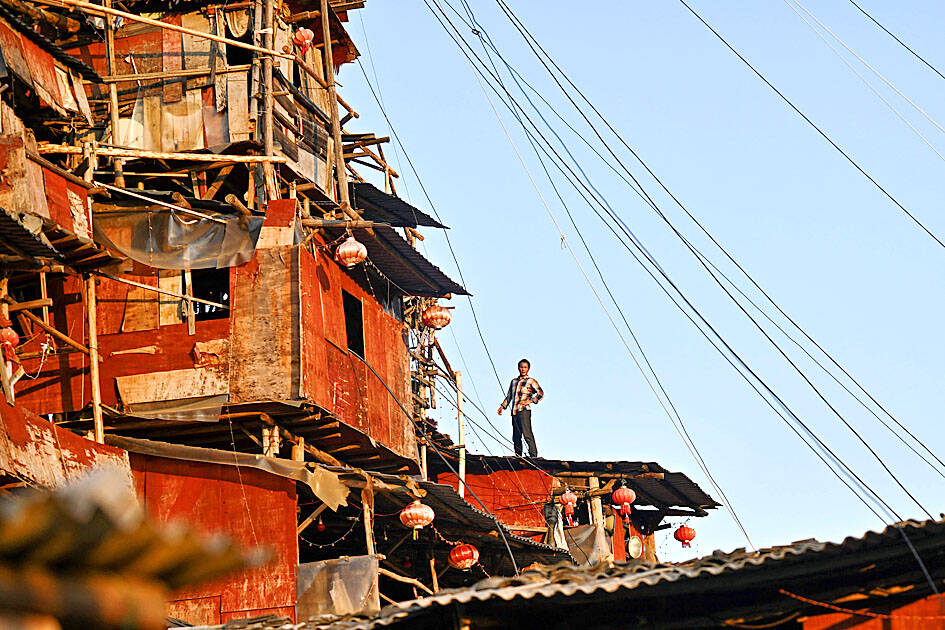Surrounded by the rubble of demolished homes, Chen Tianming’s ramshackle tower of faded plyboards and contorted beams juts into the sky in southwestern China, a monument to one man’s stubbornness.
Authorities razed most of Chen’s village in Guizhou province in 2018 to build a lucrative tourist resort in a region known for its spectacular rice paddies and otherworldly mountain landscapes.
Chen, 42, refused to leave, and after the project faltered, defied a flurry of demolition notices to build his family’s humble stone bungalow higher and higher.

Photo: AFP
He now presides over a bewildering 10-story, pyramid-shaped warren of rickety staircases, balconies and other add-ons, drawing comparisons in Chinese media to the fantastical creations of legendary Japanese animator Hayao Miyazaki.
“I started building out of practicality, trying to renovate and expand our home,” Chen said as he climbed ladders and ducked wooden beams in his labyrinthine construction.
“But then it became more of an interest and hobby that I enjoyed,” he said.

Photo: AFP
Chen’s obsessive tinkering and lack of building permits continue to draw ire from the local government.
The higher floors where he sleeps sway in the wind, and dozens of ropes and cables tether the house to the ground as if the whole thing might one day float away.
“When I’m up here... I get the sense of being a nomad,” Chen said, gazing out at apartment blocks, an airport and distant mountains. “People often say it’s unsafe and should be demolished... but I’ll definitely never let anyone tear it down.”
Local authorities promised to compensate villagers, but Chen’s parents refused, and he vowed to help them protect the home his grandfather had built in the 1980s.
Even as neighbors moved out and their houses were bulldozed, Chen stayed put, even sleeping alone in the house for two months “in case [developers] came to knock it down in the night.”
Six months later, like many ill-considered development projects in highly indebted Guizhou, the resort was canceled.
Virtually alone in the ruined village, Chen was now master of a “nail house” — a Chinese term for those whose owners dig in and refuse to relocate despite official compensation offers.
A quirk of China’s rampant development and partial private property laws, nail houses sometimes make headlines for delaying money-spinning construction projects or forcing developers to divert roads.
Even as Chen forged ahead, completing the fifth floor in 2019, the sixth in 2022 and the seventh in 2023, he continued to receive threats of demolition.
In August last year, his home was designated an illegal construction, and he was ordered to destroy everything except the original bungalow within five days.
He says he has spent tens of thousands of yuan fighting the notices in court, despite losing several preliminary hearings. However, he continues to appeal.
“I’m not worried. Now that there’s no one developing the land, there’s no need for them to knock the place down,” he said.
In recent years, ironically, Chen’s house has begun to lure a steady trickle of tourists itself.
On Chinese social media, users describe it as China’s strangest nail house, likening it to the madcap buildings in Studio Ghibli masterpieces Howl’s Moving Castle and Spirited Away.
As dusk falls, Chen illuminates his home with decorative lanterns, and people gather on the nearby dirt road to admire the scene.
“It’s beautiful,” local resident He Diezhen said as she snapped photos.
“If there are no safety issues, it could become an [official] local landmark,” she said.
Chen said the house makes many visitors remember their whimsical childhood fantasies.
“[People] dream of building a house for themselves with their own hands... but most can’t make it happen,” he said. “I not only thought of it, I made it a reality.”

FEROCIOUS FISH-EATER Scientists have found a new species of dinosaur from the Cretaceous Period, a ‘hell heron’ that stalked the rivers, deep in the Saharan desert At a remote Sahara desert site in Niger, scientists have unearthed fossils of a new species of Spinosaurus, among the biggest of the meat-eating dinosaurs, notable for its large blade-shaped head crest and jaws bearing interlocking teeth for snaring fish. It prowled a forested inland environment and strode into rivers to catch sizable fish like a modern-day wading bird — a “hell heron,” as one of the researchers put it, considering it was about 12 meters long and weighed 5-7 tons. The dinosaur presented a striking profile on the Cretaceous Period landscape of Africa some 95 million years ago as it hunted

‘COST OF DEFECTION’: Duterte’s announcement could be an effort to keep allies in line with the promise of a return to power amid political uncertainty, an analyst said Philippine Vice President Sara Duterte yesterday announced she would run for president of the Southeast Asian nation of 116 million in 2028. Duterte, who is embroiled in a bitter feud with Philippine President Ferdinand Marcos Jr, was impeached last year only to see the country’s Supreme Court throw the case out over procedural issues. Her announcement comes just days before her father, former Philippine president Rodrigo Duterte, begins a pretrial hearing at the International Criminal Court (ICC) in the Netherlands over crimes against humanity allegedly committed as part of a brutal crackdown on drugs. “I offer my life, my strength and my future

NOT YET THERE: While the show was impressive, it failed to demonstrate their ability to move in unstructured environments, such as a factory floor, an expert said Dancing humanoid robots on Monday took center stage during the annual China Media Group’s Spring Festival Gala, China’s most-watched official television broadcast. They lunged and backflipped (landing on their knees), they spun around and jumped. Not one fell over. The display was impressive, but if robots can now dance and perform martial arts, what else can they do? Experts have mixed opinions, with some saying the robots had limitations and that the display should be viewed through a lens of state propaganda. Developed by several Chinese robotics firms, the robots performed a range of intricate stunts, including martial arts, comedy sketches and choreographed

DRUG WAR: The former president said there was no campaign to kill addicts, but his speeches called for violence and told police to use lethal force if necessary Former Philippine president Rodrigo Duterte earned global infamy for the deadly drug crackdown that led to his arrest over crimes against humanity charges, despite his huge popularity at home. A profane-lipped populist and self-professed killer, Duterte’s anti-crime campaign resulted in the deaths of thousands of alleged dealers and addicts. Rights groups said many of those killed were poor men, often without any proof they were linked to drugs. Yet, while drawing condemnation abroad, tens of millions of Filipinos backed his swift brand of justice — even as he joked about rape in his rambling speeches, locked up his critics and failed to